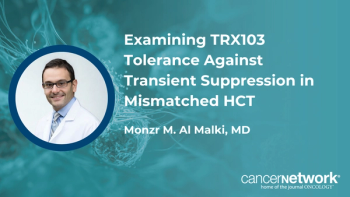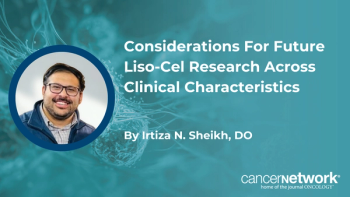
Oncology NEWS International
- Oncology NEWS International Vol 8 No 3
- Volume 8
- Issue 3
Allogeneic BMT Effective in Ph+ Acute Lymphoblastic Leukemia
MIAMI BEACH-Long-term follow-up of 23 patients with Philadelphia chromosome-positive (Ph+) acute lymphoblastic leukemia (ALL) in first complete remission showed a relatively low relapse rate at 3 years when treated with allogeneic bone marrow transplant from HLA-matched siblings, D.S. Snyder, MD, reported at the American Society of Hematology (ASH) annual meeting.
MIAMI BEACHLong-term follow-up of 23 patients with Philadelphia chromosome-positive (Ph+) acute lymphoblastic leukemia (ALL) in first complete remission showed a relatively low relapse rate at 3 years when treated with allogeneic bone marrow transplant from HLA-matched siblings, D.S. Snyder, MD, reported at the American Society of Hematology (ASH) annual meeting.
Being positive for the Philadelphia chromosome is an extremely poor-risk factor for pediatric and adult ALL patients, said Dr. Snyder, of the City of Hope National Medical Center, Duarte, California.
In this study, from City of Hope and Stanford University, patients were treated between 1984 and 1997. All patients but one were conditioned with fractionated total body irradiation (TBI) (1,320 cGy) and high-dose etoposide (60 mg/kg). One patient received high-dose cyclophosphamide instead of etoposide, and another patient received both drugs.
Nine patients died following transplanttwo from relapsed leukemia and seven from transplant-related causes. The 3-year probabilities of disease-free survival and relapse were 65% and 12%, respectively. The 3-year probabilities for patients who were transplanted after 1992 were 81% and 11%, respectively.
The study did not show any differ-ences in risks of relapse or disease-free survival based on the expression of p190 vs p210 bcr-abl oncogene, Dr. Snyder said, and the relatively low relapse rate may reflect enhanced antileukemic activity of etoposide/TBI, compared to cyclophosphamide-based regimens.
He noted that the favorable disease-free survival for patients transplanted after 1992 may be explained by improvements in supportive care, specifically the prevention and treatment of fungal and cytomegalovirus (CMV) infections.
Articles in this issue
almost 27 years ago
Strong Upsurge in HIV and Tuberculosis Predictedalmost 27 years ago
NCAB Urges Repeal of Law Requiring Research Data Disclosurealmost 27 years ago
Response to Ontak Leads to Improved QOL in CTCLalmost 27 years ago
Medicare Will Phase in Risk-Adjusted HMO Payments Over 5-Year Periodalmost 27 years ago
Patients Need to Understand Cancer Testing Limitationsalmost 27 years ago
Assessing the Value of the Pain Intensity Assessment Toolsalmost 27 years ago
More Than 500 Clinical Practice Guidelines Now Available On-linealmost 27 years ago
Inefficient Burning of Fossil Fuels Puts Children at Riskalmost 27 years ago
IOM Urges Replacing Race With Ethnicity in Cancer StudiesNewsletter
Stay up to date on recent advances in the multidisciplinary approach to cancer.










































